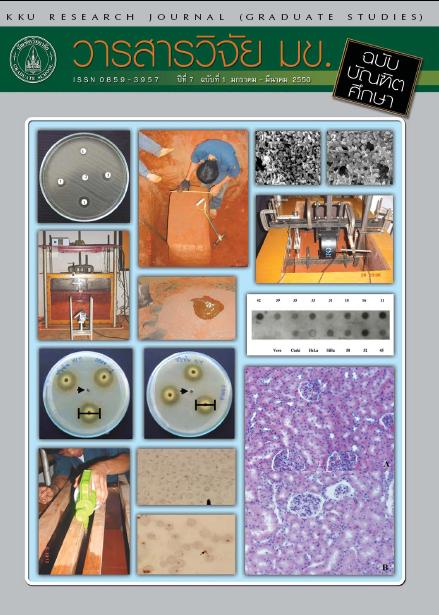Metacognitive Strategy in Open-ended Problem-Solving Processes(ยุทธวิธีเกี่ยวกับความตระหนักในการคิดในกระบวนการแก้ปัญหาปลายเปิด)
Keywords:
Metacognitive strategy(ยุทธวิธีเกี่ยวกับความตระหนักในการคิด), Metacognition(ความตระหนักในการคิด), Open-ended problem(ปัญหาปลายเปิด)Abstract
การวิจัยครั้งนี้มีวัตถุประสงค์เพื่อศึกษายุทธวิธีเกี่ยวกับความตระหนักในการคิดที่ใช้ในกระบวนการแก้ปัญหาปลายเปิด โดยใช้ระเบียบวิธีวิจัยเชิงคุณภาพแบบกรณีศึกษา ทำการวิเคราะห์ข้อมูลโดยการวิเคราะห์โปรโตคอล (Protocol Analysis) และการบรรยายเชิงวิเคราะห์ (Analytic Description) การเก็บรวบรวมข้อมูลทำโดยการให้กลุ่มเป้าหมายซึ่งเป็นนักเรียนชั้นมัธยมศึกษาปีที่ 2 ภาคเรียนที่ 1 ปีการศึกษา 2548 โรงเรียนบ้านวังชัย อำเภอน้ำพอง จังหวัดขอนแก่น จำนวน 3 กลุ่ม กลุ่มละ 3 คน ร่วมมือกันทำกิจกรรมการแก้ปัญหาปลายเปิด 2 กิจกรรม ได้แก่ ปัญหาการขยายรูปสี่เหลี่ยม และปัญหาการแข่งขันวิ่งมาราธอน เป็นการทำกิจกรรมในบริบทนอกห้องเรียน และไม่มีการแทรกแซงระหว่างการทำกิจกรรม ผู้วิจัยและผู้ช่วยวิจัยทำการบันทึกวีดิทัศน์ บันทึกเทปเสียง และบันทึกภาคสนาม พฤติกรรมการทำกิจกรรมของกลุ่มเป้าหมายตลอดการแก้ปัญหาทั้ง 2 กิจกรรม ข้อมูลที่นำมาวิเคราะห์เพื่อศึกษายุทธวิธีเกี่ยวกับความตระหนักในการคิดได้แก่ ก) ข้อมูลในรูปโปรโตคอลที่ได้จากการถอดเทปเสียงและเทปจากการบันทึกวีดิทัศน์การทำกิจกรรมของกลุ่มเป้าหมายทั้ง 3 กลุ่มทั้ง 2 กิจกรรม ข) ข้อมูลในรูปโปรโตคอลที่ได้จากการถอดเทปเสียงการสัมภาษณ์นักเรียนเป็นรายบุคคลหลังจากการทำกิจกรรมแต่ละกิจกรรม ค) ข้อมูลที่เป็นงานเขียนของนักเรียนที่ทำในระหว่างการทำกิจกรรมแก้ปัญหา ง) ข้อมูลจากการบันทึกภาคสนามของผู้วิจัยและผู้ช่วยวิจัย และ จ) ข้อมูลทั่วไปเกี่ยวกับภูมิหลังของนักเรียนที่ได้จากการสัมภาษณ์ครูอย่างไม่เป็นทางการ ทำการวิเคราะห์ข้อมูลตามกรอบการวิเคราะห์การแก้ปัญหาที่ผู้วิจัยปรับมาจากกรอบการวิเคราะห์ข้อมูลของชอเอ็นเฟลด์ (Schoenfeld, 1985) และกรอบการวิเคราะห์ข้อมูลของกูสและกัลเบรท (Goos and Galbraith, 1996) ผลการวิจัยพบว่ากลุ่มของนักเรียนที่มีความตระหนักในการคิดในการแก้ปัญหาปลายเปิดนั้นมีการใช้ยุทธวิธีเกี่ยวกับความตระหนักในการคิดเพื่อสำรวจตรวจตรา (Monitoring) ความก้าวหน้าในระหว่างการแก้ปัญหาปลายเปิด มีลักษณะดังต่อไปนี้ 1) เมื่อนักเรียนแสดงพฤติกรรมการสำรวจ ทำให้ปรากฏตำแหน่งที่เกิดข้อมูลใหม่หรือขั้นตอนดำเนินการใหม่ 2) เมื่อนักเรียนแสดงพฤติกรรมการวางแผน-การนำไปใช้ และการตรวจสอบทำให้เกิดการประเมินส่วนย่อยหรือการประเมินโดยรวม 3) ลักษณะเฉพาะของนักเรียนที่แสดงถึงการมียุทธวิธีเกี่ยวกับความตระหนักในการคิดเกิดขึ้นในขณะที่กำลังแก้ปัญหาปลายเปิดได้แก่ การเป็นผู้สร้างวิธีการหาคำตอบและการเป็นผู้ตรวจสอบ
The purpose of the present research was to study the students' metacognitive strategy for open-ended problem-solving process. The study employed the qualitative, case-study research method. The collected data were analyzed by means of protocol analysis and analytic description. The target group was consisted of 9 grade-8 students in Ban Wangchai School in Nampong District, Khon Kaen Province during the first semester of the 2005 school year. The students were organized into 3 groups of 3 students each. Each group of the students was asked to solve 2 problems collectively. One of the problems was about the enlargement of a square, and the other was about marathon race. The activity was organized outside the classroom and was without the researcherûs interference. While the students were working on the problems the researcher and her co-researcher made videotape and tape recording and took field notes of the activity. The data which had been collected analyzed for the purpose of studying the studentsû metacognitive strategy for problem-solving processes included: 1) their protocol analysis, 2) student interview, 3) their written works, 4) field notes, and 5) the studentsû background information. The obtained data were analyzed by means of Schoenfeldûs (1985) episode analysis and Goos & Galbraithûs (1996) metacognitive strategy analysis. The findings showed that the students used metacognitive strategy during the process of their open-ended problem-solving activity in order to monitor their progress. The strategy was consisted of 1) exploration behavior which resulted in new information or new procedure, 2) planning-implementation and verification behavior which resulted in local as well as global assessments, and 3) development of some special characteristics during the problem-solving sessions, i.e. procedure generator and checker



